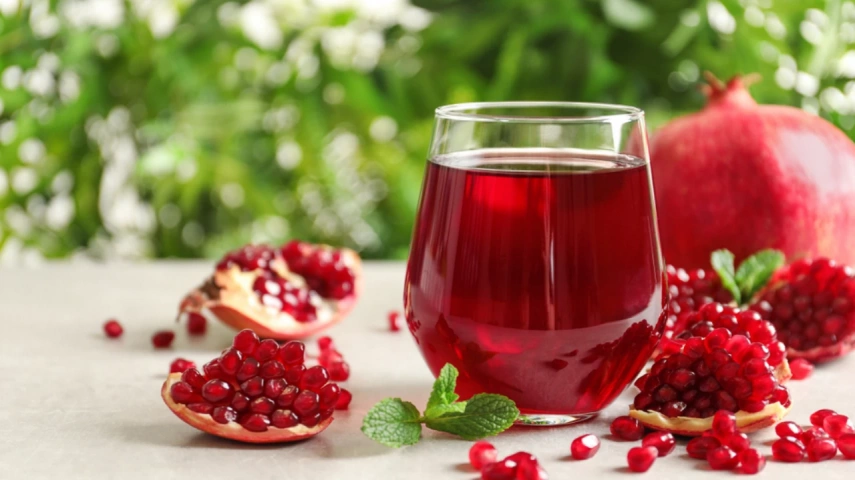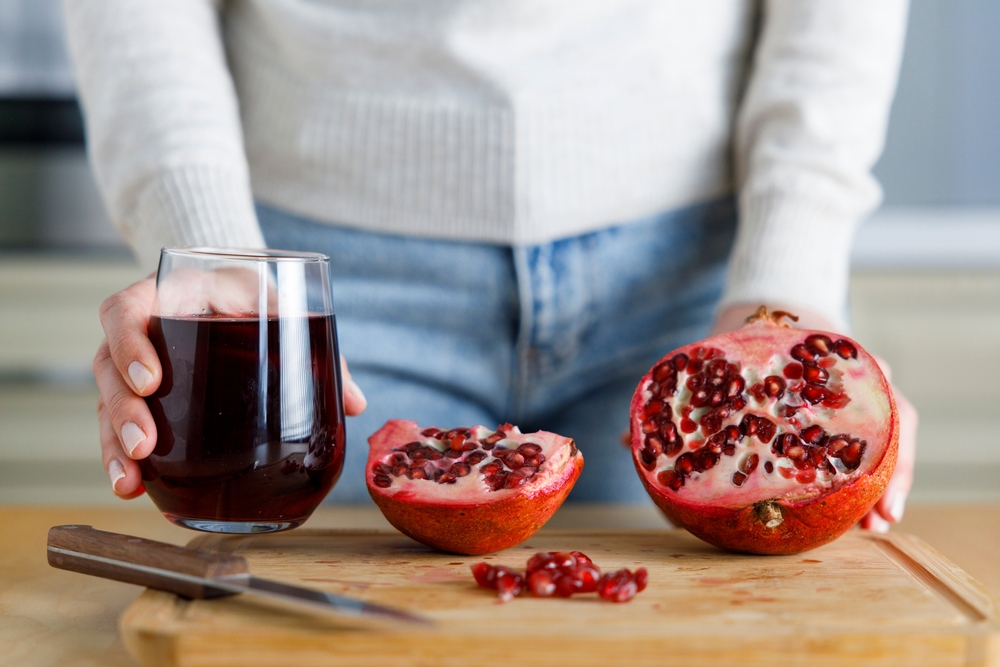Side Effects of Pomegranate: An Expert Guide on this Superfruit
This nutrition-packed superfruit can be a great addition to a healthy diet. But beware; the side effects of pomegranate are severe if taken in large amounts.

The word pomegranate comes from two separate Latin words; “pomum” meaning apples, and “granatum" meaning seeded. The juicy, ruby-red seeds bursting with flavor are undeniably delicious, but you do not want to overconsume before knowing the potential side effects of pomegranate.
They may range from low blood pressure to allergic reactions, blood thinning, itching, and causing rashes to appear when applied topically, and may react if interacted with other drugs. You may find this surprising given the status of pomegranate as a superfruit.
Our contributor Mary Sabat, RDN, LD and Ace Certified Trainer, says, “Common side effects of consuming pomegranate are generally mild and rare but may include digestive discomfort such as diarrhea, stomach cramps, or nausea, particularly when consumed in excessive amounts. Pomegranates are also relatively high in natural sugars, so individuals with diabetes or those watching their sugar intake should be mindful of their consumption. Additionally, some people may experience allergic reactions like itching or hives when they come into contact with pomegranate or its juice.”
Read on to understand the detrimental effects of pomegranates and ways to avoid any risks.
Uses of Pomegranate Juice
The superfruit pomegranate is oh-so-delicious with its sweet, tangy, and juicy flavor. These little ones are also full of vitamins and minerals. Yup, the pomegranate seeds are a great source of vitamin C, vitamin K, and potassium.
Let’s not forget the juice. The flavorful beverage has proven benefits when consumed in adequate amounts.

1. Pomegranate juice for Blood Pressure
The proven evidence suggests that pomegranate juice has a high content of polyphenols which help people with high blood pressure.
The polyphenols in pomegranates are also the ones that protect the body against any cellular damage. The nitrate in the fruit gets converted into nitric oxide, which further relaxes the blood vessels of the body, improving blood flow and reducing blood pressure (1).
People who are determined to control their blood pressure naturally and stay away from medications may consume pomegranate juice daily. However, one should consult a doctor if they notice any side effects. Also, juice may not be a replacement for any medications.
2. Pomegranate Juice to Prevent Cancer
There are a variety of compounds in pomegranate that have shown anti-cancer properties. Polyphenols present in pomegranate juice inhibit the growth of carcinogenic cells, inducing apoptosis (the death of carcinogenic cells). This function is similar to the process of radiotherapy.
It also contains ellagic acid, which has anti-inflammatory and anti-cancer effects.
Particular evidence from research performed in-vitro on breast cells confirmed that pomegranate juice inhibited breast cancer cell growth.
Research suggests that the ingredients present in pomegranates may also prevent lung, prostate, and skin cancers (2).
3. Pomegranate Juice for Alzheimer's Disease

There is no cure for Alzheimer’s disease. However, with proper medication and certain lifestyle changes the progression of the disease may be controlled. In a study, elderly patients who consumed pomegranate juice continuously for four weeks every day improved their memory function and other age-related memory declines (3).
The antioxidant and anti-inflammatory properties of polyphenols protect the brain against damage and inflammation, one of the leading causes of Alzheimer’s disease.
4. Pomegranate Juice for Arthritis
Arthritis is one of the most common diseases among people of older age and those who live at higher altitudes. The swelling and tenderness of joints increase with age.
In a study, patients with osteoarthritis of the knee consumed pomegranate juice for 6 weeks, which resulted in a reduction in the breakdown of the cartilage.
The antioxidant property helps patients control the growth of rheumatoid arthritis (3).
5. Pomegranate Juice for Fertility
Since ancient times, people have connected pomegranate juice with an increased fertility rate. However, there is very little evidence to support this fact.
One of the older studies mentions the improvement of male sperm motility when experimented on rodents (4).
6. Pomegranate Juice for Heart Disease

While there is no sure-shot way to escape from any type of heart disease, you could prevent it by consuming pomegranate juice daily in a particular amount.
Pomegranate extracts contain a high concentration of antioxidants, which can help reduce inflammation and protect against oxidative stress. It is a condition that can harm cells and has been linked to the onset of heart disease.
The benefits of pomegranate juice for heart disease have been the subject of numerous studies.
In one study, people with coronary artery disease who drank pomegranate juice for three months had better blood flow to their hearts and experienced a lower risk of heart attack. This finding was reported in the American Journal of Cardiology (5).
7. Pomegranate Juice for Nutrient Deficiency
Pomegranate is a nutrition-packed fruit. It contains a good source of vitamin E, an antioxidant, and blood-clotting vitamin K. Managing blood pressure and blood sugar levels is made easier by the presence of magnesium, present in the fruit (6).
8. Pomegranate Juice for Diabetes
Pomegranate is considered a medicinal plant in the Middle East. There is little evidence supporting the role of pomegranate juice in benefiting people with type 2 diabetes.
Research conducted found a reduction in insulin resistance and improved insulin sensitivity upon continuous intake of pomegranate juice for three months (7).
Another study published in the journal found that drinking pomegranate juice for 12 weeks reduced insulin resistance and improved insulin sensitivity in type 2 diabetes patients (8).
Pomegranates are nutritious fruits full of vitamins, minerals, and antioxidants.
Our contributor Mary Sabat, says, “While there is no specific recommended daily intake of pomegranate, consuming about one to two servings (equivalent to one whole pomegranate or 8-16 ounces of pomegranate juice) per day can offer potential health benefits. Pomegranates are rich in antioxidants, particularly polyphenols like anthocyanins and ellagic acid, which have been linked to improved heart health, reduced inflammation, and potential cancer-fighting properties. However, excessive consumption can lead to calorie and sugar intake concerns, so moderation is key.”
The juice is considered safe and beneficial when consumed in moderation. On the other hand, some people may experience common or severe side effects from consuming pomegranates or their juice in excess. Following are some potential side effects of consuming too much pomegranate:
1. Risk of Fetal Growth Restriction in Pregnant Women

The juice is considered to be a safe option for pregnant women; however, there is no evidence to prove the unborn child's safety. Sticking to pomegranate juice could be safer than switching to artificial pomegranate supplements, pomegranate extracts, or pomegranate peels for consumption.
A randomized trial on mice suggests that consumption of pomegranate juice may alter the size of the fetal head circumference and abdominal circumference in both male and female birth groups. The data further does not support pomegranate juice as an effective natural remedy for fetal growth restriction syndrome in pregnant women (9).
2. Risk of Sudden Low Blood Pressure
Pomegranate juice has shown positive results in some studies on patients at risk of high blood pressure. It may be due to the presence of polyphenols in it.
While this may be beneficial, pomegranate could also become a reason for concern if not taken in moderate amounts and counteracted with medicine. Consuming excessive amounts of juice along with blood pressure medications may result in a sudden drop in blood pressure, which may lead to dizziness and fainting (10).
3. Interference with Medications

There is a high chance that pomegranate juice will interfere with medications as it has the potential to react with the enzymes that metabolize drugs. This may lead to alterations in the effects of medications.
The most common alteration is seen in people taking blood pressure medications, followed by blood thinners and antidepressants.
Since pomegranate juice relaxes the blood vessels, it is advised against intaking the juice two weeks before any surgery since it may lead to severe blood loss.
Pomegranate juice interacts with ACE inhibitors to control high blood pressure. Some of the potential drugs include Benazepril (Lotensin), Captopril (Capoten), Enalapril (Vasotec), Fosinopril (Monopril), Lisinopril (Zestril), and Ramipril (Altace).
Statins, which are used to lower cholesterol levels, are also known to react and may lead to kidney damage. Some of the potential drugs include Atorvastatin (Lipitor), Fluvastatin (Lescol), Lovastatin (Mevacor), Pravastatin (Pravachol), Rosuvastatin (Crestor), and Simvastatin (Zocor) (11 ).
Although the interaction between pomegranate and medications is not observed frequently and reacts only when excessively consumed, it is best to seek professional advice before changing or starting medications.
4. Allergic Reactions
One of the most serious side effects is an allergic reaction to pomegranates. As per the registered data and research, pomegranate allergy in some people may lead to shortness of breath and even may lead to death. Although it is rare, the symptoms could vary from person to person.
Some of the most common symptoms of pomegranate allergy include skin reactions, itching, redness, and rashes. Respiratory problems such as difficulty in breathing, wheezing, or shortness of breath are also observed.
An 18-year-old patient suffered from angioedema which is swelling of the eyes, lips, and genitals, vomiting, and abdominal pain within 10 minutes after ingestion of pomegranate (12).
Dosage: How Much Pomegranate Juice Should I Take?
Now that you are aware of the benefits of pomegranate juice and do not want to risk any side effects, you must know how much is the optimum amount you should consume daily.
The evidence suggests that the optimal dosage of pomegranate juice varies depending on the individual’s age and weight.
A general recommendation is to consume 240-360 ml of pure, unsweetened juice per day, or one cup of pomegranate seeds per day to benefit from its nutrients and antioxidants.
502 ml ounces per day for patients suffering from atherosclerosis and 236 ml per day for patients suffering from prostate cancer are recommended daily (13).
It might be possible to have an allergic reaction that leads to an upset stomach or severe side effects. Therefore, it is a good idea to start with a small amount and gradually increase the dosage if needed.
What to do if You Face Allergies

In the event of a severe allergic reaction, the first step should be to contact a medical professional as soon as possible.
An anaphylactic reaction, which includes having a skin rash, vomiting, or shortness of breath, is one possible side effect that could occur within a few seconds to a minute of consuming pomegranate juice.
In the case of a skin rash, avoid scratching the skin, instead, try and apply ice cubes to reduce the inflammation. Aloe vera has an anti-inflammatory effect; you could also apply fresh aloe vera pulp to the affected area or apply a mixture of apple cider vinegar and water with a cotton ball to the affected area to soothe the burning effect (14).
It is best to consult an emergency physician if you have shortness of breath, diarrhea, or vomiting.
Conclusion
Pomegranate juice indeed provides many health benefits; from being high in nutrients to low in calories and sugar, this superfruit is more than that. The side effects of pomegranate juice could be harmful if taken in excess. Pomegranate juice may cause allergic reactions, interact with warfarin and blood pressure medications, cause a sudden drop in blood pressure, cause dizziness, or increase digestive problems.
Although science has confirmed its benefits in the form of the presence of polyphenols that help lower blood pressure, prevent carcinogenic effects, and help patients with memory loss, it is recommended that you drink an average of 230 ml of pomegranate juice per day.
Therefore, take pomegranate juice in the given amount, and it may not cause any adverse effects. In the event of an allergic reaction, consult a doctor.
Contributor: Mary Sabat, RDN, LD, Ace Certified Trainer - Body Designs Ltd.
Source:
1. Effects of pomegranate juice on blood pressure: A systematic review and meta-analysis of randomized controlled trials
https://pubmed.ncbi.nlm.nih.gov/27888156/
2. Potent health effects of pomegranate
https://www.ncbi.nlm.nih.gov/pmc/articles/PMC4007340/
3. Intake of Pomegranate Prevents the Onset of Osteoarthritis: Molecular Evidences
https://www.ncbi.nlm.nih.gov/pmc/articles/PMC4825888/
4. Potent health effects of pomegranate
https://www.ncbi.nlm.nih.gov/pmc/articles/PMC4007340/
5. Fruits for Prevention and Treatment of Cardiovascular Diseases
https://pubmed.ncbi.nlm.nih.gov/28608832/
6. Pomegranates, raw
https://fdc.nal.usda.gov/fdc-app.html#/food-details/169134/nutrients
7. Pomegranate and type 2 diabetes
https://pubmed.ncbi.nlm.nih.gov/23684435/
8. The effect of pomegranate (Punica granatum) supplementation on metabolic status in patients with type 2 diabetes: A systematic review and meta-analysis
https://pubmed.ncbi.nlm.nih.gov/32951728/
9. Pomegranate Juice Supplementation Alters Utero-Placental Vascular Function and Fetal Growth in the eNOS−/− Mouse Model of Fetal Growth Restriction
https://www.ncbi.nlm.nih.gov/pmc/articles/PMC6103006/
10. Effects of pomegranate juice on blood pressure: A systematic review and meta-analysis of randomized controlled trials
https://pubmed.ncbi.nlm.nih.gov/27888156/
11. Pomegranate juice consumption inhibits serum angiotensin converting enzyme activity and reduces systolic blood pressure
https://pubmed.ncbi.nlm.nih.gov/11500191/
12. Pomegranate anaphylaxis due to cross-reactivity with Peach LTP (Pru p 3)
13. Efficacy and Safety of Pomegranate Medicinal Products for Cancer
https://www.ncbi.nlm.nih.gov/pmc/articles/PMC4359844/
14. ALOE VERA: A SHORT REVIEW





 JOIN OUR WHATSAPP CHANNEL
JOIN OUR WHATSAPP CHANNEL

































































































